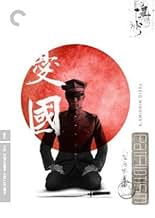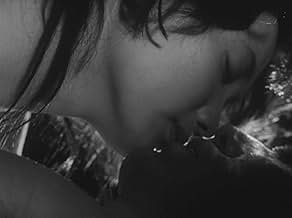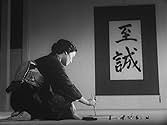CALIFICACIÓN DE IMDb
7.4/10
2.2 k
TU CALIFICACIÓN
Agrega una trama en tu idiomaA Noh dramatization of the suicides of Lt. Shinji Takeyama and his wife Reiko. After participating in a failed 1936 coup and being ordered to execute his friends, he bids his wife an intimat... Leer todoA Noh dramatization of the suicides of Lt. Shinji Takeyama and his wife Reiko. After participating in a failed 1936 coup and being ordered to execute his friends, he bids his wife an intimate farewell and commits harakiri.A Noh dramatization of the suicides of Lt. Shinji Takeyama and his wife Reiko. After participating in a failed 1936 coup and being ordered to execute his friends, he bids his wife an intimate farewell and commits harakiri.
Opiniones destacadas
Short film, i was suprised by the fact that apart from the music that it was silent. The lighting is beautiful and the film is made with obvious care and passion. The end of the film is in direct contrast to the rest with its very extreme imagry of the seppuku ritual, but altogether this film gets my vote as a very artisitc mood film.... A lot of film makers now should consider the use of that lighting!!!!!!!
This is a very hard movie to rate or even review, as it is so foreign. Now I don't mean 'foreign' because it's made abroad, but 'foreign' because the entire story, style and spirit of this short film is alien to many out there who are not from an older generation in Japan. The film is a Noh play that is entirely without dialog--just music, LOTS of intertitle cards explaining the situation and a couple going through a long and drawn out ritual suicide!! See what I mean?! This ain't a Spielberg or John Ford film!! Instead, it's horribly violent and disgusting to watch because it is so real. Yet, at the time of its release, the film was admired because it was a lesson in honor and fidelity! It all stems from a real incident in 1936 when an officer was ordered to execute his friends who had participated in an attempted coup. So, if your idea of fun is watching a couple slowly and silently disembowel themselves, then by all means watch it. After all, the cinematography is amazingly good and is one of the prettier black & white films I have seen and the music is lovely as they eviscerate themselves. Sadly, I had hoped that the short was instead an explanation of WHY the coup was attempted in the first place--now THAT would have been interesting.
Kids: Don't try this at home!
Kids: Don't try this at home!
make sure to watch the version with the new score by aaron embry. it's much more beautiful as the ambient music adds so much to the film where the older music made it seem dated which was unfortunate because the cinematography was so ahead of it's time.
.
.
The momentum of the DEI movement has waned, and in some cases, even regressed. The historical bias against homosexuality largely stems from religious and ideological doctrines rather than scientific reasoning, much like how witch hunts and political purges were once justified under the banner of democracy. The modern ethical framework that once constrained such primal instincts is now being challenged again.
Homosexuality, rather than being an anomaly, is one of many natural variations of human sexuality. If the pioneering work of Dr. Magnus Hirschfeld (1868-1935) had not been suppressed by the Nazi regime, scientific recognition of sexual diversity might have progressed more coherently. Instead, prejudice prevailed, delaying a deeper biological understanding of love in its many forms.
Diversity is the phenomenon that can't be circumvented but can be subdued through natural selection in every environmental change. Sometimes it reminds me of Mishima's "Confession of a Mask". His inherent covete to male brawny flesh is elucidated minutely rather passionately, with contrasting his ambivalent but requisite feeling for male to be attracted to chubby cute girl. We can see many works treating sex and death in Mishima's literature. Mishima's writing is strikingly detailed-his protagonist's attraction to the muscular male physique, particularly the famous image of St. Sebastian pierced with arrows, is described with both yearning and shame, reflecting an internal conflict that mirrors broader societal taboos, which apparently implies his ultimate desire was to be crucified to death in "naked". His life was obviously not personal and private, but really publicly exposed and theatrical, a really fragile "exhibitionist". And it was even his intention.
Yukoku (Patriotism), one of Mishima's most distilled expressions of his core themes-sex, death, beauty, and devotion, was strikingly intense work, particularly in the 1966 film adaptation that Mishima himself directed and starred in. Mishima is not writing about loyalty or patriotism-he's transforming the act of death into something sacred, erotic, and theatrical.
In his life, what is diversified for humans was sublimated and condensed. Ordinarily it's too arcane to clarify and classify. Thanks to him, we can feel and assume what it means, what it came from and what it leads to. Not so analytical, but rather instinctively. Begin from small empathy in his description to larger extention of understanding.
Homosexuality, rather than being an anomaly, is one of many natural variations of human sexuality. If the pioneering work of Dr. Magnus Hirschfeld (1868-1935) had not been suppressed by the Nazi regime, scientific recognition of sexual diversity might have progressed more coherently. Instead, prejudice prevailed, delaying a deeper biological understanding of love in its many forms.
Diversity is the phenomenon that can't be circumvented but can be subdued through natural selection in every environmental change. Sometimes it reminds me of Mishima's "Confession of a Mask". His inherent covete to male brawny flesh is elucidated minutely rather passionately, with contrasting his ambivalent but requisite feeling for male to be attracted to chubby cute girl. We can see many works treating sex and death in Mishima's literature. Mishima's writing is strikingly detailed-his protagonist's attraction to the muscular male physique, particularly the famous image of St. Sebastian pierced with arrows, is described with both yearning and shame, reflecting an internal conflict that mirrors broader societal taboos, which apparently implies his ultimate desire was to be crucified to death in "naked". His life was obviously not personal and private, but really publicly exposed and theatrical, a really fragile "exhibitionist". And it was even his intention.
Yukoku (Patriotism), one of Mishima's most distilled expressions of his core themes-sex, death, beauty, and devotion, was strikingly intense work, particularly in the 1966 film adaptation that Mishima himself directed and starred in. Mishima is not writing about loyalty or patriotism-he's transforming the act of death into something sacred, erotic, and theatrical.
In his life, what is diversified for humans was sublimated and condensed. Ordinarily it's too arcane to clarify and classify. Thanks to him, we can feel and assume what it means, what it came from and what it leads to. Not so analytical, but rather instinctively. Begin from small empathy in his description to larger extention of understanding.
This film prophetically (Yukio Mishima committed suicide in 1970) and dramatically portrays the ritual suicide of a dishonored Japanese patriot. It's an extraordinary short watch but may be a bit intense for those who dislike graphic gore. I doubt I will ever forget the experience of having seen this.
¿Sabías que…?
- TriviaAfter Mishima's death on 25 November 1970, all prints of this film were rumored to have been destroyed by his wife Yoko. However, in August 2005, original film negatives were "discovered" at the late author's residence in Ota Ward, Tokyo. About 40 reels have now been found in what Japanese media refer to as an "airtight tea box". According to Hiroaki Fujii (78), the movie's producer (who at the time apparently urged Yoko to keep the original intact), the recovered elements are in "pristine condition". The film will be released on DVD by Shinchosha early in 2006.
- ConexionesReferenced in Mishima: Una vida en cuatro capítulos (1985)
Selecciones populares
Inicia sesión para calificar y agrega a la lista de videos para obtener recomendaciones personalizadas
Detalles
- Tiempo de ejecución30 minutos
- Color
- Mezcla de sonido
- Relación de aspecto
- 1.37 : 1
Contribuir a esta página
Sugiere una edición o agrega el contenido que falta

Principales brechas de datos
By what name was Yûkoku (1966) officially released in Canada in English?
Responda

















